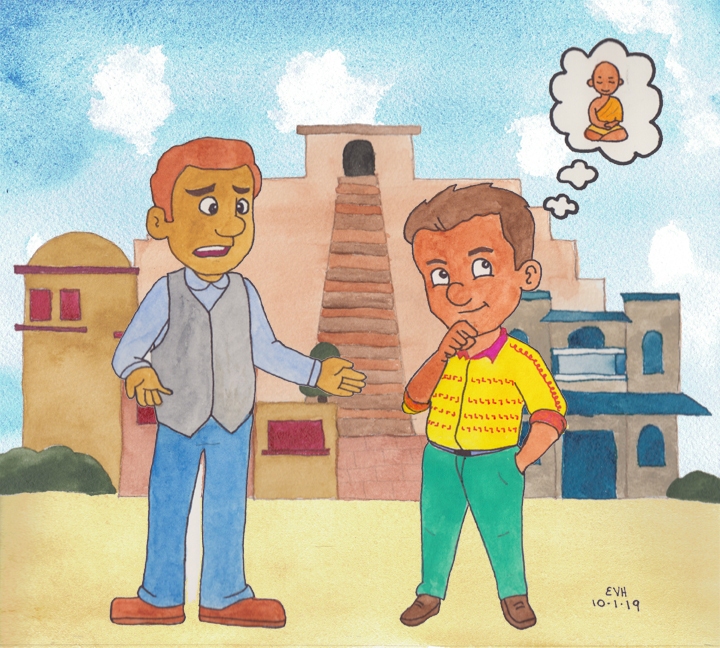
Jataka 171
Kalyāṇa-dhamma
The Auspicious Act
as told by Eric Van Horn
originally translated by William Henry Denham Rouse, Cambridge University
originally edited by Professor Edward Byles Cowell, Cambridge University
These stories tend to be very simple, but they often contain surprising twists. This is one of them.
“Oh, King, when people hail us.” The Master told this story while he was at Jetavana. It is about a deaf mother-in-law.
It is said that there was a wealthy landowner in Sāvatthi. He was a true believer in the Dharma. He had taken the Three Refuges (Buddha, Dharma, and Saṇgha) and the Five Virtues (the lay precepts). One day he set out to listen to the Master at Jetavana. He brought plenty of ghee and condiments of all sorts, flowers, perfumes, and so forth. At the same time, his wife’s mother went to visit her daughter. She brought a present of solid food and porridge. Now she was a little hard of hearing.
After dinner, when one feels a little drowsy, she said by way of keeping herself awake, “Well, and does your husband live happily with you? Do you get along well?”
“Why, mother, what a thing to ask! You could hardly find a holy monk who is so good and virtuous as he!”
The good woman did not quite understand what her daughter had said, but she caught the word “monk” and she cried, “Oh dear, why has your husband become a monk!” And she made a great commotion.
Everybody who lived in that house heard it, and they cried, “News! Our squire has become a monk!” People heard the noise, and a crowd gathered at the door to find out what it was. “The squire who lives here has become a monk!” was all they heard.
Our squire listened to the Buddha’s discourse, then he left the monastery to return to the city. About halfway there a man met him, and he cried, “Why, master, they say you’ve become a monk, and all your family and servants are crying at home!”
Then these thoughts passed through his mind. “People say I have become a monk when I have done nothing of the kind. An auspicious speech must not be neglected. Today I will become a monk!” Then he turned right around and went back to the Master. “You paid your visit to the Buddha,” the Master said, “and went away. What brings you back here again?”
The man told him what had happened, adding, “An auspicious speech, sir, must not be neglected. So here I am, and I wish to become a monk.” Then he received the lower and the higher ordination. (These are 1) novice ordination and 2) full ordination. Usually you have to be a novice monk for some time before receiving full ordination, but he must have been a very kind and virtuous person.) He lived a good life, and very soon he became an arahant (fully awakened/enlightened).
The story became known in the Saṇgha. One day they were discussing it in the Dharma Hall in this way: “I say, friend, the squire ordained because he said ‘an auspicious speech must never be neglected,’ and now he has become an arahant!”
The Master came in and wanted to know what it was they were discussing. They told him. He said, “Monks, wise men in days long past also entered the Saṇgha because they said ‘an auspicious speech must never be neglected’,” and then he told them this story of the past.
Once upon a time, when Brahmadatta was the King of Benares, the Bodhisatta was reborn as a rich merchant’s son. When he grew up and his father died, he took his father’s place.
Once he went to pay his respects to the King. At the same time his mother-in-law went to visit her daughter. She was a little hard of hearing, and all happened just as it has happened now. The husband was on his way back from paying his respects to the King when he was met by a man. The man said, “They say you have become a monk, and there’s such pandemonium in your house!”
The Bodhisatta, thinking that auspicious words must never be neglected, turned right around and went back to the King. The King asked what brought him back again. “My lord,” he said, “all my people are weeping over me, I am told, because they believe that I have become a monk. And I have done nothing of the kind. But auspicious words must not be neglected, and I will, indeed, become a monk! I want your permission to become a monk!”
And he explained the circumstances in the following verses:
“Oh King, when people call us by the name
Of ‘holy’, we must make our acts the same.
We must not waver or fall short of it.
We must take up the task for very shame.
“Oh King, this name has been bestowed on me.
Today they cry how holy I must be.
Therefore I would a recluse live and die.
I have no taste for joy and revelry.”

Figure: “They say you have become a monk!”
In this way the Bodhisatta asked the King’s leave to embrace the holy life. Then he went away to the Himalayas and became a recluse. He cultivated the Faculties (1) faith/confidence, 2) energy, 3) mindfulness, 4) concentration/samadhi and 5) wisdom/insight) and the Attainments (jhānas) and was at last reborn in Brahma’s heaven.
The Master, having ended this discourse, identified the birth: “Ānanda was the King in those days, and I was the rich Benares merchant.”
